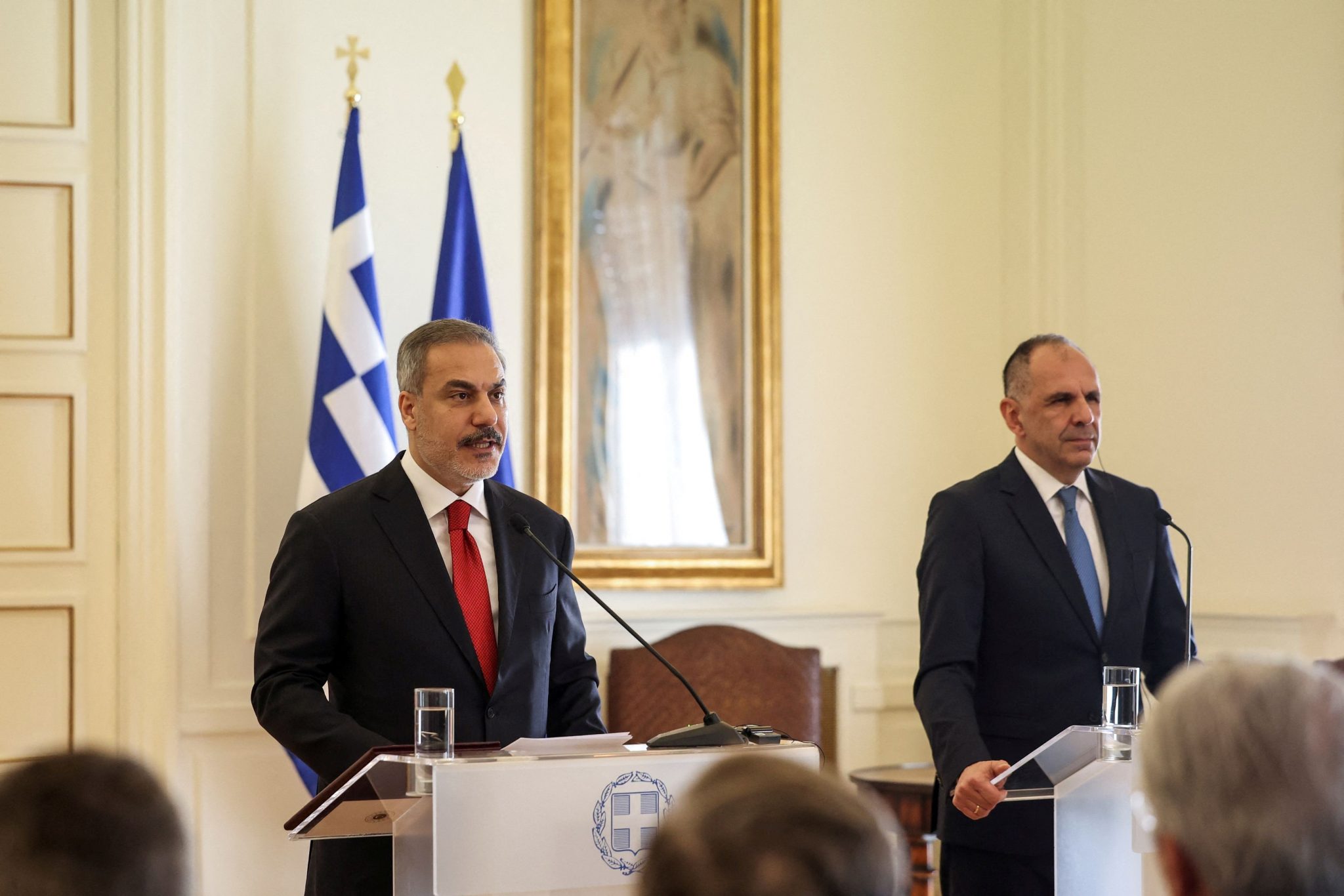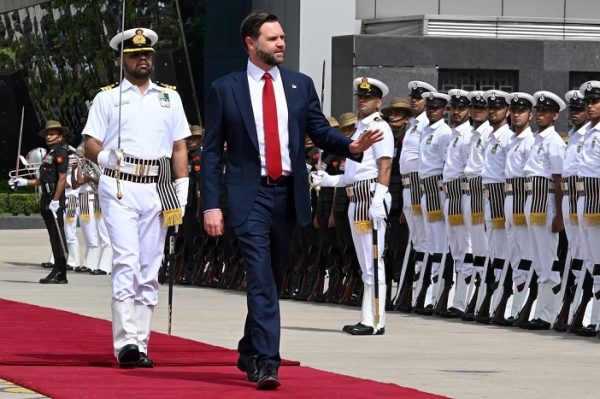
Turkish Foreign Minister Hakan Fidan returned to full throttle “revisionist mode” during an interview with a local television network this past week, saying there’s “more than one problem” in the Aegean.
The latter position has been steadfastly rejected over the past decades by successive Greek governments, which maintained that the only difference needing resolution is delineating of the sea’s continental shelf – and more recently, a delimitation involving the expanded sovereignty concept of an Exclusive Economic Zone (EEZ).
In televised statements a week after he arrived in Athens for a lightning visit and talks with his Greek counterpart, Giorgos Gerapetritis, Fidan regurgitated Turkish positions charging a “militarization of islands; (isle) formations whose status has not been clarified; territorial waters and airspace.”
“We can proceed with those issues after first making the initial description,” Fidan added, in comments squarely directed at a domestic audience.
“The problem is the militarization of islands, which must be demilitarized; the continental shelf, territorial waters, places whose status has not been clarified, airspace, the EEZ. There are many issues. These issues, once we get the description right, we can proceed in the right way to resolve them. We need to see how a different approach can be taken, looking, of course, at previous efforts. If this possibility exists… Instead of just describing the problems, we should reach higher, and as our president says… as for the Aegean Sea, which is a wonderful environment, we want to turn it into a paradise that serves the prosperity, security, peace and happiness of the two countries – with political and military agreements that we will sign.”
Previously strained to frigid bilateral relations between Athens and Ankara first “thawed” in the wake of election victories by both Turkish President Recep Tayyip Erdogan and Greek PM Kyriakos Mitsotakis last year and then moved towards rapprochement followed by meetings at all levels – ones aimed at generating progress and cooperation in various sectors.
Between 2020 and 2023 the Erdogan administration had exhibited a belligerent and aggressive stance against fellow NATO member Greece, at one point, in fact, facilitating the attempted mass incursion of thousands of third country nationals living in Turkey into Greece from the Evros land border. That attempt was thwarted by the Greek side, with the Covid pandemic then ending tension along the border.
Athens has flatly dismissed, and at times sharply ridiculed, official Turkish positions regarding the demilitarization of the eastern Aegean islands. Most importantly, the Greek side has pointed out that repeated Turkish military action, threats and belligerence over the past decades make defense of territory paramount, as per the UN Charter’s Article 51 regarding states’ individual and collective self-defense. The latter conviction is presented when Ankara cites the 1947 Paris peace treaties and a provision for annexation of the Dodecanese islands by WWII victor Greece. Another provision in these treaties cites the demilitarized status of the specific islands.
Turkey was not a signatory of the specific treaty.
The Greek side has also repeatedly and vigorously cited the legal point of no connection in international law between sovereignty and demilitarization, with the concept of national sovereignty enjoying full and never conditional status.
Greece also maintains a six-nautical mile limit in the Aegean Sea but has strenuously repeated that it retains the right to extend territorial waters to 12 nautical miles, in line with UNCLOS, an international treaty signed and ratified by EU member-states, and most of the countries in the world.
Turkey is a notable exception, with successive governments since the mid 1990s periodically threatening a “cause for war (casus belli)” – emanating from a resolution passed by Turkey’s grand assembly – in case Athens exercises its legal rights.
Source: Tovima.com
Latest News

Pope Francis: A Pontiff Who Reshaped the Papacy and Sparked a Global Conversation
His first words from the balcony of St. Peter’s Basilica—“Brothers and sisters, good evening”—set the tone for a pontificate that would challenge norms, favor mercy over dogma, and bring the papacy closer to the people.

When Blue Skies was Unmasked as ND’s Political ‘Slush Fund’
The fact that so many top New Democracy (ND) party cadres were paid by the firm Blue Skies, owned by Thomas Varvitsiotis and Yiannis Olympios, without ever citing this publicly, raises very serious moral issues, regardless of the legality

Greek Women’s Water Polo Team Top in the World after 13-9 Win Over Hungary
The Greek team had previously defeated another tournament favorite, the Netherlands, to reach the final.

S&P Raises Greek Rating; BBB with Stable Outlook
S&P’s decision raises the Greek economy to the second notch of investment grade ladder, at BBB with a stable outlook.

Greek Tourism Optimistic About Demand from American Market
A recent survey by MMGY Global, conducted from April 3–5 with a sample of 1,000 U.S. adults, found that 83% of Americans still intend to take leisure trips over the next 12 months, a slight drop from 87% in late February

New Exposé by Domumento Reveals Nefarious Triangular Link of ‘Black Money’ with New Democracy, Blue Skies, & Truth Team
The latest exposé by the Documentonews.gr news site lays bare what appears to be a surreptitious path of indirect financing of ND through the business sector—transactions that, as widely understood, rarely occur without expectations of reciprocal benefit

PM Meloni Meets Vice President Vance in Rome Signalling Optimism on Ukraine Talks
Meloni emphasized the strength and strategic value of the Italy-U.S. partnership.

Airbnb: Greece’s Short-Term Rentals Dip in March Amid Easter Shift
Data from analytics firm AirDNA shows that average occupancy for short-term rentals dropped to 45% in March, down from 49% the same month last year.

Easter Week in Greece: Holy Friday in Orthodoxy Today
At the Vespers service on Friday evening the image of Christ is removed from the Cross and wrapped in a white cloth

Meloni and Trump Meet in Washington, Vow to Strengthen Western Ties
“I am 100% sure there will be no problems reaching a deal on tariffs with the EU—none whatsoever,” Trump stressed.










![Πλημμύρες: Σημειώθηκαν σε επίπεδα ρεκόρ στην Ευρώπη το 2024 [γράφημα]](https://www.ot.gr/wp-content/uploads/2025/04/FLOOD_HUNGRY-90x90.jpg)


![Ξενοδοχεία: Μεγάλο το ενδιαφέρον για επενδύσεις στην Ελλάδα – Η θέση της Αθήνας [γραφήματα]](https://www.ot.gr/wp-content/uploads/2025/03/Athens-hotels-90x90.jpg)


![Airbnb: Πτωτικά κινήθηκε η ζήτηση τον Μάρτιο – Τι δείχνουν τα στοιχεία [γράφημα]](https://www.ot.gr/wp-content/uploads/2024/07/airbnb-gba8e58468_1280-1-90x90.jpg)





















![Ξενοδοχεία: Μεγάλο το ενδιαφέρον για επενδύσεις στην Ελλάδα – Η θέση της Αθήνας [γραφήματα]](https://www.ot.gr/wp-content/uploads/2025/03/Athens-hotels-600x399.jpg)


 Αριθμός Πιστοποίησης
Αριθμός Πιστοποίησης